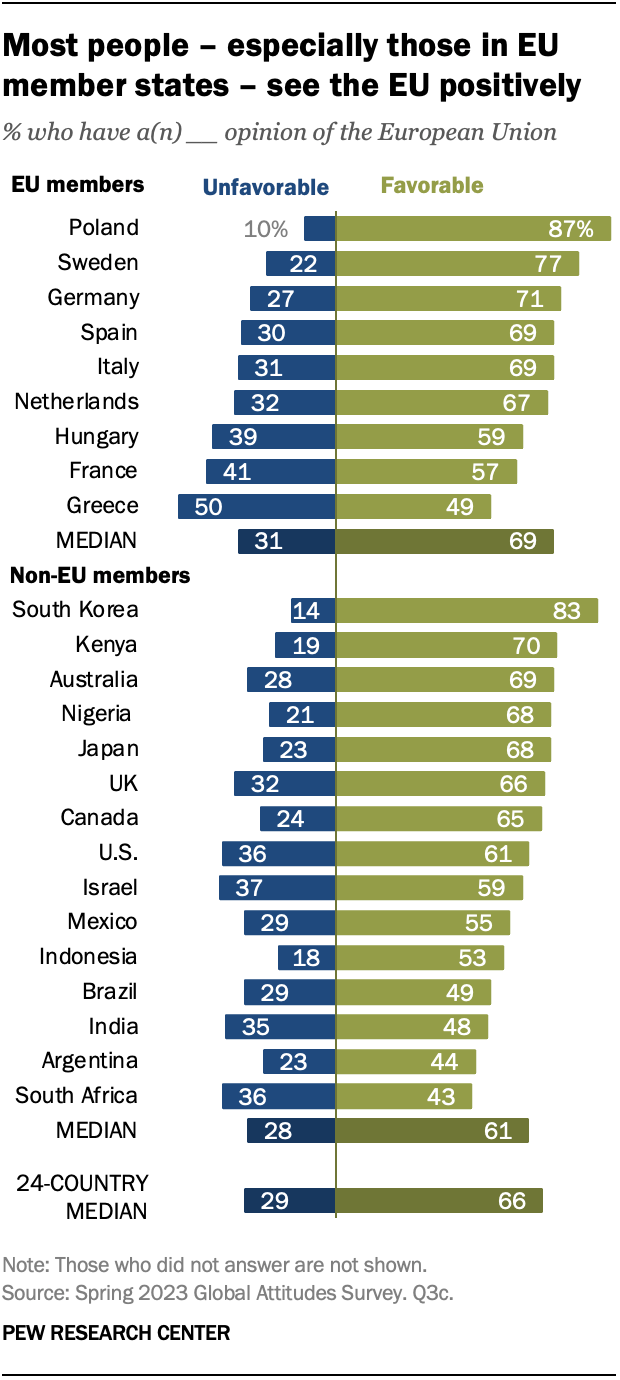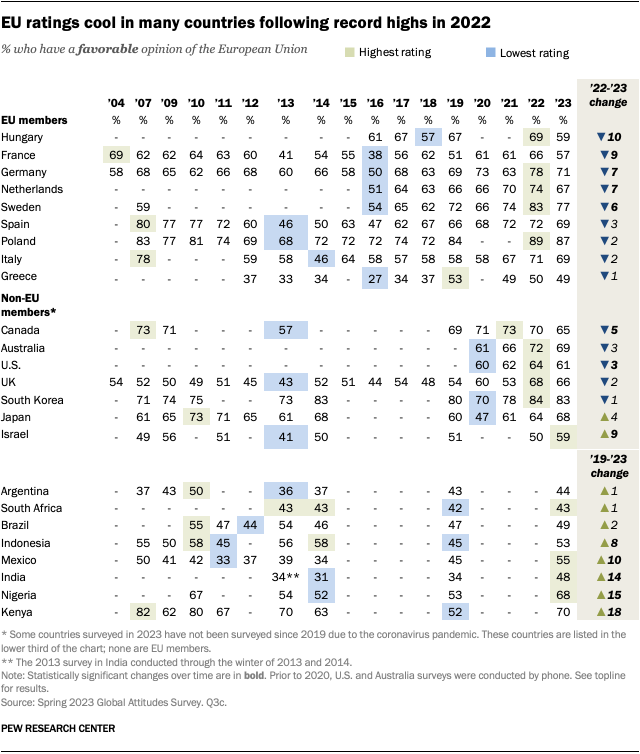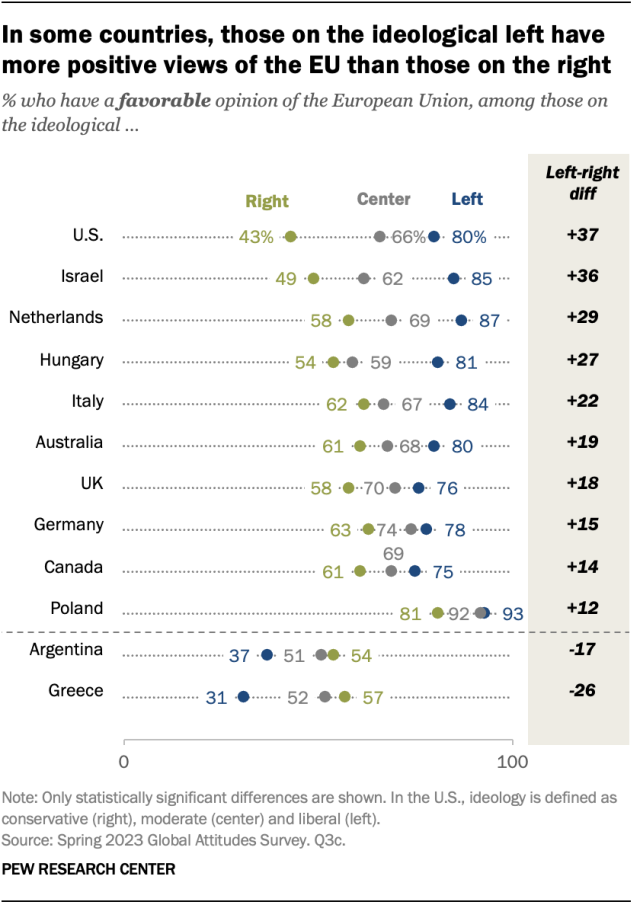The European Union receives largely favorable ratings globally, according to a Pew Research Center survey conducted this spring. Across 24 countries surveyed, a median of 66% give the EU a positive rating, while 29% give it a negative one.
This Pew Research Center analysis explores views of the European Union in 24 countries in North America, Europe, the Middle East, the Asia-Pacific region, sub-Saharan Africa and Latin America. EU favorability is examined through long-term trend data and demographic analysis. Due to the coronavirus pandemic, this is the first year since 2019 that the Center’s Global Attitudes Survey has included countries from Africa and Latin America.
For non-United States data, this analysis draws on nationally representative surveys of 27,285 adults conducted from Feb. 20 to May 22, 2023. All surveys were conducted over the phone with adults in Canada, France, Germany, Greece, Italy, Japan, the Netherlands, South Korea, Spain, Sweden and the United Kingdom. Surveys were conducted face-to-face in Argentina, Brazil, Hungary, India, Indonesia, Israel, Kenya, Mexico, Nigeria, Poland and South Africa. In Australia, we used a mixed-mode probability-based online panel.
In the U.S., we surveyed 3,576 adults from March 20 to March 26, 2023. Everyone who took part in this survey is a member of the Center’s American Trends Panel (ATP), an online survey panel that is recruited through national, random sampling of residential addresses. This way, nearly all U.S. adults have a chance of selection. The survey is weighted to be representative of the U.S. adult population by gender, race, ethnicity, partisan affiliation, education and other categories. Read more about the ATP’s methodology.
Here is the question used for the analysis, along with responses, and the survey methodology.

In the nine EU member states surveyed, a median of 69% have a favorable view of the organization, while 31% have an unfavorable view. Majorities in all but one country – Greece – express a favorable opinion. Views are especially positive in Poland, where nearly nine-in-ten (87%) say they have a positive opinion of the EU.
Outside the bloc of member states, views of the EU are somewhat similar, with a median of 61% across 15 countries giving a positive rating. In each country, larger shares of people have a positive view of the EU than have a negative one. Views are most favorable in South Korea, where roughly eight-in-ten (83%) express a positive opinion of the EU. And in the United States, about six-in-ten (61%) hold a favorable view of the organization.
In some nonmember countries, sizable shares of people do not offer an opinion on the EU. For example, two-in-ten or more in Argentina, Brazil, Indonesia and South Africa do not share an opinion.
Favorable views of the EU over time
Among member nations, favorable views of the EU have dropped in some places since 2022. This is most evident in Hungary, where favorable views have dropped by 10 percentage points, approaching a historic low after reaching a record high in 2022.
Hungary has clashed with the EU over the last year, particularly on sending EU military aid to Ukraine and imposing sanctions against Russia. On balance, Hungarians prefer decreasing economic sanctions on Russia, and around three-quarters say maintaining access to Russian oil and gas is more important than being tough with Russia on Ukraine, according to recent Center surveys.

In other countries, the decline in favorability reflects a return to levels from before Russia’s invasion of Ukraine in 2022. In the Netherlands, for example, the share of people with a favorable view of the EU has changed from 70% in 2021, to 74% in 2022, to 67% in 2023. Opinions have also become somewhat less positive since 2022 in France (-9 points), Germany (-7) and Sweden (-6).
Among nonmember countries, views of the EU have also become less favorable in Canada and the United States. However, they have become more favorable in some countries, including Israel, where ratings have reached a record high of 59%, up 9 percentage points since last year. (The 2023 survey was conducted before the latest Israel-Hamas war.)
In some countries where the Center has not been able to survey since 2019 due to the coronavirus pandemic, views have become significantly more positive since we last asked this question. In India, Kenya, Mexico and Nigeria, the shares who have favorable views of the EU have increased by 10 or more percentage points since 2019. This increase may be similar to the one we observed in our 2022 survey, fielded during the early stages of Russia’s military invasion of Ukraine.
How views of the EU vary within countries
As observed in previous years, in both member and nonmember countries, people who place themselves on the ideological left often express a more favorable view of the EU than those who place themselves on the right. This difference is most evident in the U.S., where liberals are 37 percentage points more likely than their conservative counterparts to view the EU positively (80% vs. 43%).
A similar pattern exists in Israel, where there is a difference of 36 points between those on the left and those on the right (85% vs. 49% favorable). Eight other countries also have double-digit ideological differences on this question.

Another pattern that has persisted over time is that, in some European countries, supporters of right-wing populist parties are less likely to have a favorable opinion of the EU. For example, in the Netherlands, those who support the right-wing Party for Freedom (PVV) are 22 points less likely than those who don’t support PVV to view the EU positively. Similar patterns exist in France, Germany, Italy, Poland, Sweden and the United Kingdom.
And in Hungary, supporters of the right-wing ruling party Fidesz, led by Prime Minister Viktor Orban, are 25 points less likely than those who don’t support Fidesz to have a favorable view of the EU. However, those who support Jobbik, another right-wing party, are more likely to view the EU positively than non-supporters. (For more information on how we classify populist parties, read the Appendix to our report on Hungarian and Polish views of Russia and the U.S.)
Views of the EU also vary by age in some countries. In 10 countries, adults ages 18 to 39 are more likely than those 40 and older to have a favorable view of the EU. For example, in the UK, 81% of those under 40 express a positive opinion of the organization, while 60% of those 40 and older say the same. In Italy, there is a 15-point difference between those under 40 and their older counterparts (79% vs. 64% favorable) on this question.
Note: This is an update of a post originally published on Oct. 13, 2022. Here is the question used for the analysis, along with responses, and the survey methodology.

